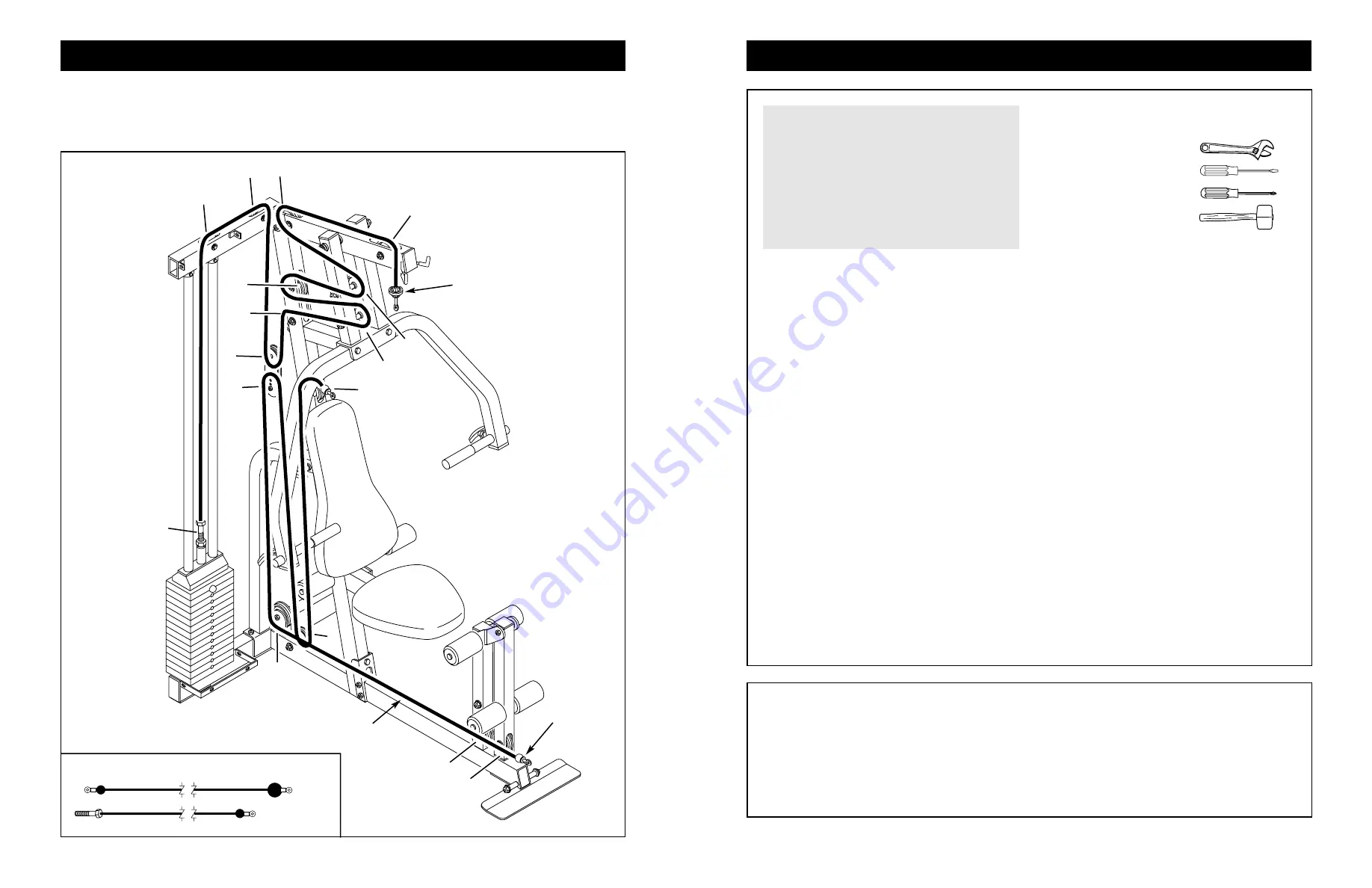
4
5
16
Cable Diagram
The diagram below shows the proper routing of the High Cable (73) and the Low Cable (72). The numbers show
the correct route for each Cable. Make sure that the Cables are routed correctly, that the pulleys move
smoothly, and that the cable traps do not touch or bind the Cables. Incorrect cable routing can damage
the training system.
High Cable (73)
Large Ball
Low Cable (72)
2
8
9
1
3
7
6
4
10
5
Cable ID Chart
(72)
(73)
3
2
1
6
MAKE SURE THAT YOU HAVE THE FOLLOWING
TOOLS:
• Two (2) adjustable spanners
• One (1) standard screwdriver
• One (1) phillips screwdriver
• One (1) rubber mallet
• You will also need grease or petroleum jelly, a
small amount of soapy water, and clear tape or
masking tape.
Note: Assembly will be more convenient if you have
a socket set, a set of open-end or closed-end span-
ners, or a set of ratchet spanners.
HOW TO IDENTIFY PARTS
To help you identify the small parts used in assembly,
we have included a PART IDENTIFICATION CHART
in the centre of this manual. Place the chart on the
floor and use it to easily identify parts during each
assembly step. Note: Some small parts may have
been pre-attached. If a part is not in the parts
bag, check to see if it has been pre-attached.
HOW TO ORIENT PARTS
As you assemble the training system, make sure
that all parts are oriented exactly as shown in the
drawings.
TIGHTENING PARTS
Tighten all parts as you assemble them, unless
instructed to do otherwise.
QUESTIONS?
If you have questions after reading the assembly
instructions, please call our Customer Service
Department at 0345-089009.
ASSEMBLY REQUIRES TWO PERSONS
For your convenience and safety, assemble the
training system with the help of another person.
SET ASIDE ENOUGH TIME
Due to the many features of the training system,
the assembly process will require about six hours.
By setting aside plenty of time and by deciding to
make the task enjoyable, assembly will go smoothly.
You may want to assemble the training system over
a couple of evenings.
SELECT A LOCATION
Because of its weight and size, the training system
should be assembled in the location where it will be
used. Make sure that there is enough room to walk
around the training system as you assemble it.
HOW TO UNPACK THE BOX
To make assembly as easy as possible, we have
divided the assembly process into four stages. The
parts needed for each stage are found in individual
bags. Important: Wait until you begin each stage
to open the parts bag for that stage. Place all
parts of the training system in a cleared area and
remove the packing materials. Do not dispose of
the packing materials until assembly is completed.
MAKE ASSEMBLY EASIER FOR
YOURSELF
Everything in this manual is designed to
ensure that the training system can be
assembled successfully by anyone. Before
beginning assembly, make sure to read the
information on this page; this brief intro-
duction will save you much more time than
it takes to read it!
THE FOUR STAGES OF THE ASSEMBLY PROCESS
Frame Assembly—You will begin by assembling
the base and the uprights that form the frame.
Cable Assembly—During this stage you will
attach the cables and pulleys that connect the
arms to the weights.
Arm Assembly—During this stage you will
assemble the press arms.
Seat Assembly—During the final stage you will
assemble the seats, backrests, and shroud.
Assembly
5
































